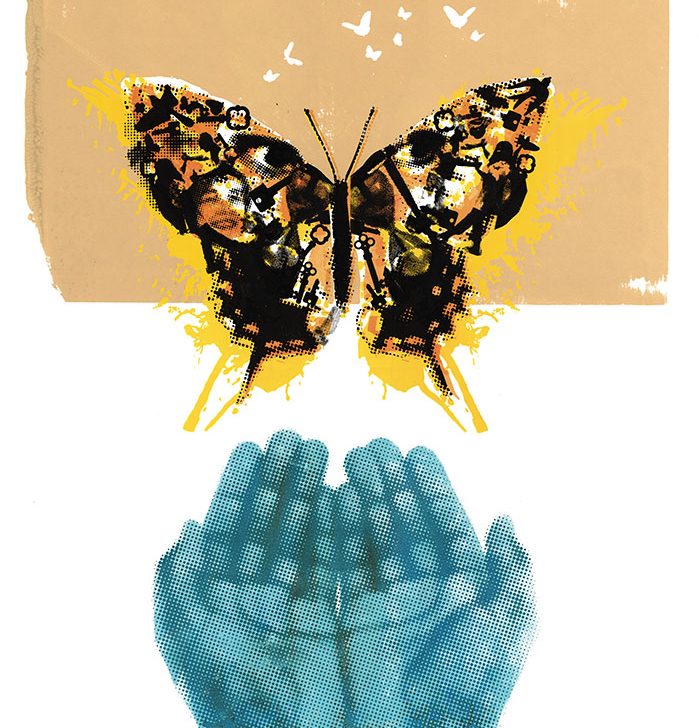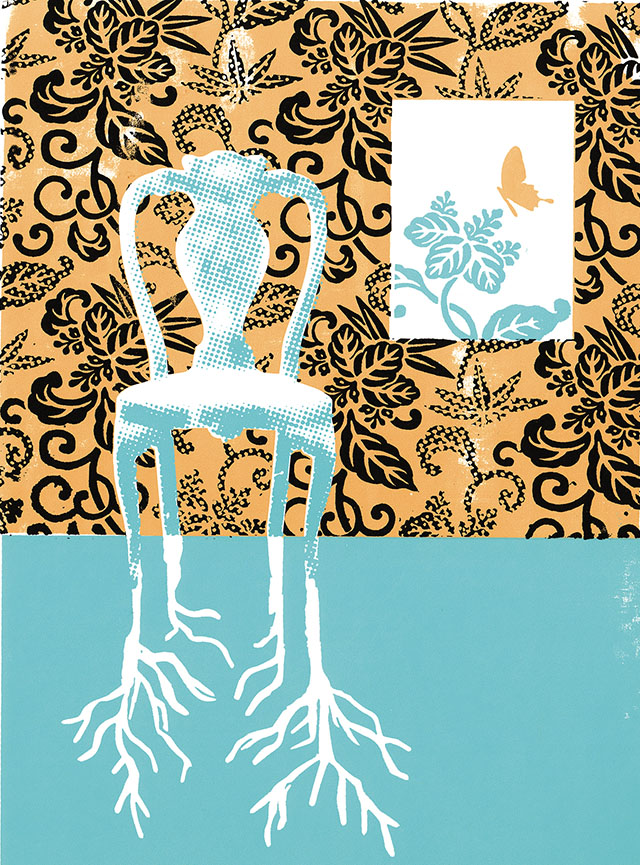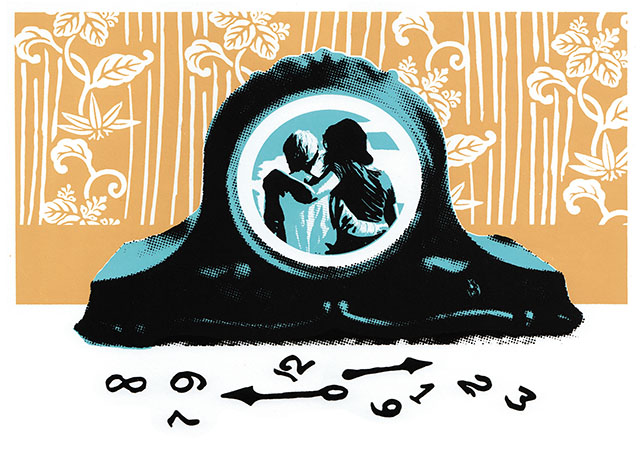
‘Grow Small’ to Find Meaning in a Wounded World
By Lucas Johnston (’98)
I teach courses on religions and environmental issues, with values and ethics always at the forefront of our conversations. We are a meaning-making species, or so we are told. We find faces in the clouds, we look up to the “man in the moon” or imagine a god — or gods— peering down upon us, judging our actions. We are not so different from our ancient ancestors. Our brains are hardwired for such proclivities. And for many, propitiation of these agents gives meaning to their lives.
As for the planet, that gaze from above hasn’t helped us to heal or even slow the infliction of wounds on the world. In the most recent scientific surveys, more than 500 species of land animals will be on the brink of extinction in the next 20 years — the same number lost over the whole of the preceding century. Biodiversity drawdown is accelerating. It’s likely that 25% of mammal species and 41% of amphibian species will die off in my lifetime. These are the very building blocks of our lives. As the eminent Stanford biologist Paul Ehrlich said in a recent study: “When humanity exterminates other creatures, it is sawing off the limb on which it is sitting.”
 How do we imagine what it means to be human, to find meaning, in such a world? How do we imagine what it means when economic, political and social “progress” can, with the swipe of a bulldozer, destroy thousands of years of human meaning-making by erasing indigenous artifacts and histories? It seems that in our present context “meaning” is reduced to control over forms of economic, political and social capital. Add to that COVID-19, a zoonotic pandemic that accentuates existing racial, economic, political and social disparities.
How do we imagine what it means to be human, to find meaning, in such a world? How do we imagine what it means when economic, political and social “progress” can, with the swipe of a bulldozer, destroy thousands of years of human meaning-making by erasing indigenous artifacts and histories? It seems that in our present context “meaning” is reduced to control over forms of economic, political and social capital. Add to that COVID-19, a zoonotic pandemic that accentuates existing racial, economic, political and social disparities.
Can our current predicament provide an avenue to rethink what it means to be human? What if we imagined these wounds and their systematic symptoms not as endemic to our species, but rather a product of our present mode of life? What if we re-imagined ourselves as a part of, as participants in, the world around us, rather than captains of a ship that continues to list violently? Maybe in the interconnected crises lies an opportunity for a midcourse correction.
As I write this during the summer, our students are in some cases sitting home, closer to their parents or guardians than they might like with little chance for a respite, or caught far away from home, weathering our current moment more alone than ever. What sorts of counsel might help in such circumstances to put into relief what it means to be human — to pursue a life that is important and meaningful — and to initiate a midcourse correction?
I suppose my only suggestion is to “grow small.” To attend to the simple ways, on totally mundane days, in which they might cultivate meaning. There is nothing revolutionary or profound here. Such suggestions are rather anemic given the scale of the problems. But some meaningful pursuits might include spending time with family and companion animals; maybe keeping a close and curious eye on other creatures; watching butterflies when we can spot them and birds when we can’t; and just asking other people to watch with us.
A contemplative exercise I’ve assigned in my courses is to go to the same place every day for a month — sit under a particular tree, nestle in a wooded spot or select a nice urban cityscape and observe the ways in which we respond to nature and how natural agents respond to us. In a city, students might note how people walking down the sidewalk have to weave through the world, stepping aside for other humans or walking around trees, which, though encircled by concrete and little urban fences, still influence the flow of human traffic. If sitting in a less developed space, they might note that they see the same birds or squirrels or other creatures each day. They might notice a rustle in the trees. Or recognize an acknowledgment by one of these creatures.
Now, those things won’t fix the drawdown of biodiversity, unsustainable subsistence regimes or the systematic racism that creates the conditions in which people of color, women, indigenous populations and others have to take to the streets to get noticed. But sometimes I wonder if they might help to cultivate the sort of people who can unplug, hug (when they can) and keep an eye out for birds. Eat food made by friends and family. Make food for friends and family. Be present in the world. For now, these small things can make meaning in a world of wounds. They are not enough. But just maybe little attempts to find meaning in the most mundane acts of outward attentiveness, compassion and care are a good first step toward a midcourse correction, toward mending our ways — and our wounds.
—Associate Professor of Religion and Environment Lucas Johnston (’98) is co-director of the University’s Environmental Program. In this role, he supports undergraduate students pursuing minors in environmental studies and environmental science. He is the author of “Religion and Sustainability: Social Movements and the Politics of the Environment.”
Epicurus and Meaningful Pleasure
By Emily Austin

For the past year, I’ve been writing a book about the ancient Greek philosopher Epicurus, who offered his readers advice about how to achieve tranquility, understood as the consistent experience of pleasure in the absence of anxiety. When the pandemic hit, and then when the country exploded in fiery protest, I thought, “This is perhaps not a very good time to be writing a book about pleasure in the absence of anxiety.” It seemed indulgent, almost perverse, to think about tranquility as accounts of suffering spiraled through my news feed.
I eventually started writing again, though, because I knew that Epicurus designed his account of pleasure and meaning with pandemics and social unrest in mind. In fact, the Roman poet Lucretius abruptly ended his spirited defense of Epicureanism, “On the Nature of Things,” with a gruesome account of a plague that struck democratic Athens, revealing in its wake the greedy and superstitious underbelly beneath the city’s veneer of excellence. My own book, by eerie coincidence, was already contracted to conclude with a chapter about pandemics. So what, in brief, does Epicurus think a pandemic tells us about living a meaningfully pleasant life?
On the personal front, the pandemic gave us a sudden and clear vantage point from which to see what actually matters to us. We missed some pleasures dearly, sometimes with an intensity that surprised us, while other pleasures dropped away almost without our noticing. I missed the classroom but not Starbucks. No doubt some of my students missed Starbucks but not the classroom. The loss we all suffered most acutely, though, was the feeling of safely being in the company of our friends and family.
And yet, let’s be honest. How often have we passed up opportunities to be with our friends and family to pursue pleasures that now seem inconsequential by comparison? If we were to map our newfound calculus of value onto our previous actions and decisions, we might discover how far we have regularly departed from the better path. Moving forward, perhaps we should keep the map in hand. Maybe we should not move to a cooler city if it takes us away from our aging parents. Maybe a rare and memorable event with friends is of greater value than laboring for an A in Introduction to Philosophy. Take it from me, a philosophy professor — your relationships are more important than my course.
Now that I’ve called attention to your college memories, let me introduce the second Epicurean point about personal pleasure during a pandemic. Epicurus believed that we can use memories of past pleasure to counteract current pain. Think of your past pleasures as a library of stories and their associated feelings that you never tire of revisiting. An Epicurean should make it a lifelong project to build a collection of memories as large, varied and rich as possible. I suspect you have recently been replaying a lot of those memories and that they are not of solitary shopping or your GPA in college. Moving forward, we should not relapse into wasting our time on things not even worth remembering.
The final, and most important, Epicurean lesson from our cultural moment is not about our private discoveries of meaning but about how those discoveries should affect our path forward as a community. For many of us, the simple truth is that the pandemic sent us home, safe and employed, not terrified of hunger or life on the streets. We had material security, physical protection and good health insurance. Just as we reacquainted ourselves with our deep gratitude for that security, we watched those assurances slip away from tens of millions. Protesters in the street showed us that many of our fellow citizens have never truly felt secure at all. So again, were we to map our newly rediscovered sense of what matters most onto how we have spent our communal resources in the past, we could measure how far afield we have strayed. Let’s keep the map in hand.
Lucretius is, I think, correct that a pandemic is a stress test and reckoning for both an individual and a community. To the extent that we pass the test, we pass it because our actions past and present are in harmony with the values that a pandemic forcefully reveals as most fundamental to human well-being. The land of easy and shallow pleasures will surely return. What remains unclear is whether they will again distract us from collectively pursuing the greater and more meaningful pleasures.
— Associate Professor of Philosophy Emily Austin, the Bitove Family Faculty Fellow, specializes in ancient Greek philosophy and focuses on ethics and emotions in her research. She is writing a book, “Doing Pleasure Right: Epicureanism as a Way of Life.”
Reframing the ‘M’ Words
by Samuel T. Gladding (’67, MAEd ’71, P ’07, ’09)

For the last few years the words “meaning” and “mattering” have been bandied about in American society like birdies in a badminton game. The popularity of these terms has a lot to do with the times in which we live and how we view the world. In a pandemic, we recognize medical personnel and grocery store clerks as people who matter and make meaningful contributions to society. In other times, different occupations and individuals have been thought of in this way.
One of the strongest voices in the conversation about the two “M words” is Gregg Levoy, a former journalist. He looks at careers as callings and states the meaning individuals receive from their work can be life enhancing if people adopt a mindset that what they do matters. Another important person in the dialogue is Laurie Santos, a professor at Yale whose course on happiness has become phenomenally popular. Santos has found overall well-being correlates strongly with shared social experiences and not with the accumulation of wealth or goods. Social experiences, like acts of kindness and gratitude, connect us with substantive involvement with others that matters. They have significant meaning for us despite our intuitive tendencies to want higher status symbols. The reason these nonmaterial behaviors are so important is that they become embedded in our memories. Put another way, we become acclimated over time to prestige possessions from luxury cars to electric guitars. Their newness fades, as does our pleasure with them. However, recollections of experiences spent with individuals we care about continue to be treasured and grow stronger with time.
One of the best ways to focus on meaning and mattering is through “savoring.” It is a process attributed to Loyola University Chicago’s Fred Bryant. In savoring, a person thinks of past happy or pleasing events whether mundane (such as a gathering with friends), significant (like a promotion) or altruistic (for example, serving the homeless). In the process, positive emotions well up again. These feelings add to the pleasurableness of our days and to positive mental health. As an example, I remember shaving the heads of disabled men in India when I worked in the homes of Mother Teresa with Wake Forest students during the winter break of 1995. Having a clean scalp mattered to these men. Otherwise, they would get lice. Though I was clumsy with the razors, I found the experience meaningful in multiple ways and now regularly savor it.
Two other practices may also add to meaning and mattering times. They are gratitude and imagery of what our lives would be in the absence of certain people. Gratitude, whether in the form of a kind word on a cloudy day or a helping hand along the way, is something we value. At such times, we are thankful. Martin Seligman, the originator of positive psychology, has found when individuals write letters of gratitude to those who have been of assistance and hand deliver them in person, the grateful writer benefits, as does the person receiving the message. Keeping a gratitude list is a positive step in finding meaning in life.
Imagining what our lives would be like had we not met certain people is a final meaning and mattering strategy. It is graphically displayed in the film “It’s a Wonderful Life” when George Bailey is shown by his guardian angel, Clarence, what the town of Bedford Falls would have become had it not been for George’s good deeds over the years. Likewise, when we examine our lives, we find others have made a difference in who we are and the way we have become. Without these individuals, our lives would not be as good. In my own life, a then Wake Forest undergraduate — Ed Hallman (’68, P ’99) — played a critical role in my decision to transfer to The Forest when the first college I attended was not a good fit. In our conversation about possibilities, Ed told me, “Wake Forest is the next best place to Heaven.” I was curious and thought I had to see for myself. Without such a strong recommendation, I might have finished my education at another institution instead of coming to “Mother So Dear.”
I am glad the “M words” have become prominent in society. They offer us guidance in the seas of change we navigate. They are like the lighthouses on the Outer Banks in that they help us stay alert, on course and move in meaningful ways that matter.
— Samuel T. Gladding (’67, MAEd ’71, P ’07, ’09) is a professor of counseling and the author of “The History of Wake Forest University, volume 6.” His latest book, “Off the Courthouse Square,” is a memoir of his first 21 years of life, including stories about his undergraduate days at Wake Forest.


